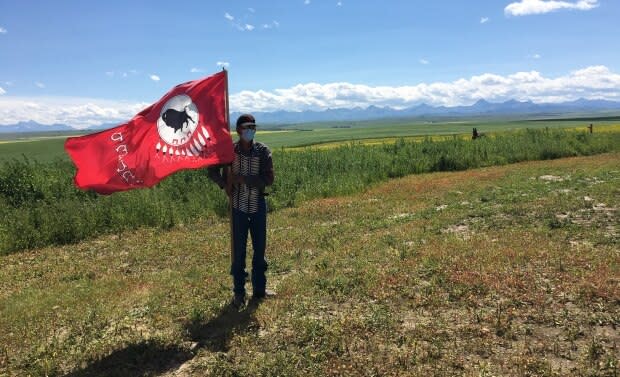Loved ones hold memorial on Piikani First Nation for lives lost to Canada's other pandemic — opioids
About two dozen figures stood silhouetted on Piikani Nation land on Sunday, two metres apart, holding white crosses for a memorial photoshoot with the Rocky Mountains in the background.
Some were First Nation members, while others came from nearby southern Alberta communities.
They all share one thing in common — they've lost loved ones to overdoses.
Lori Vrebosch held a cross, a braid of sweetgrass and a photo of her son, Mitchell.
He was 24-years-old on Oct. 2, 2018, when he accidentally overdosed on a mix of carfentanyl, fentanyl, meth and cocaine.
The photoshoot was the seventh of its kind organized by advocacy group Moms Stop the Harm, but the first on a First Nation, a partnership between Indigenous and non-Indigenous families.
...fentanyl does not discriminate but our drug policies are discriminatory... - Petra Schulz, co-founder of Moms Stop the Harm
Vrebosch said it hurt her soul to see the number of photos, and the look in the eyes of those holding the frames clutched to their chests or balanced on the white crosses.
"We share the same look in our eyes, the same broken heart," Vrebosch said.
Vrebosch's husband Brian Jackson is a Piikani band councillor.
The nation has lost six people to substance use in the past five weeks — one who collapsed at a wake held for another overdose victim.
Jackson and Vrebosch described the opioid crisis as a pandemic that's affected First Nations for years that has only increased in severity since the onset of the coronavirus pandemic.
"We're seeing a spike not with the other pandemic that we're dealing with but we're seeing spikes with drug addiction and it's hitting First Nations extremely hard," Jackson said. "It's running rampant. It's increased since COVID-19."
Jackson was unable to attend Sunday's event, as he was self-isolating after possibly coming into contact with family of the first Piikani Nation member diagnosed with COVID-19.
One case of COVID-19 in months. Six overdose deaths in a few weeks — and Vrebosch said she'd like to see a proportional health response from the government. She hopes the group's powerful photo will send that message.
Indigenous and non-Indigenous need to stand united ... to battle this failed war on drugs. - Lori Vrebosch, member of Moms Stop the Harm
"Every fire starts with a spark. And I think Indigenous people really need additional resources, tools, information, education, strategies, initiatives to help them deal with this massive loss of lives that we're experiencing here," she said.
"We wanted to show that Indigenous and non-Indigenous need to stand united at these times of racial tensions to show that we're a united community of Canadians who stand together, who have to stand together to battle this failed war on drugs. We have to be smarter, we have to do more."

Petra Schulz, co-founder of Moms Stop the Harm, lost her son Danny, 25, to an accidental fentanyl overdose in April 2014.
Schulz said it was important to the group to partner with the First Nation for the photo, although she made the point that, in essence, all of the photos so far have been taken on Indigenous land.
"The overdose crisis, while it affects everyone … fentanyl does not discriminate but our drug policies are discriminatory, that's why Indigenous people are feeling the pain in the same way but just have really so many people [affected] in their small communities and probably have fewer resources available to help their people," she said.
"If we are really truthful about truth and reconciliation … we have to address overdose deaths and other substance use related harms in Indigenous communities. Otherwise, it's just lip service."
1.6 deaths each day
According to the province, 142 people died from apparent accidental opioid overdoses during the first three months of 2020 — 1.6 people each day, on average. Of those deaths, 127 were related to fentanyl.
First Nations are disproportionately affected by opioid use — representing six per cent of Alberta's population, but 13 per cent of all overdoses between 2016 and 2018.

